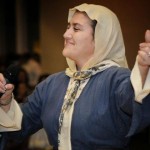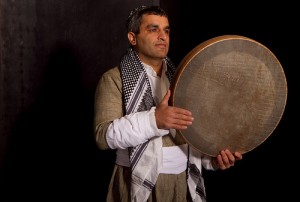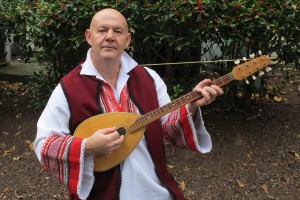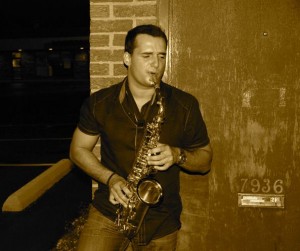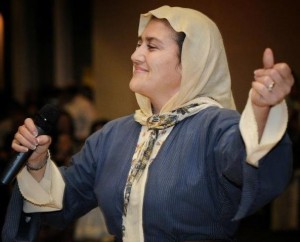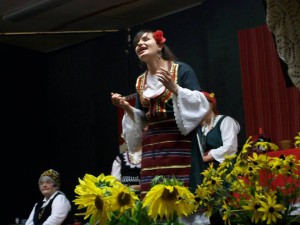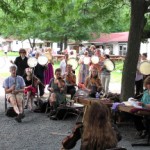
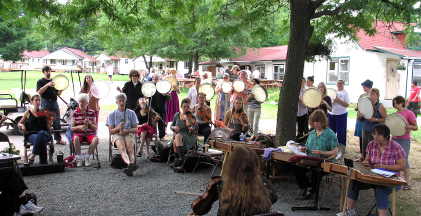
Beth Bahia Cohen’s Greek Ensemble and Polly Tapia Ferber’s Frame Drum Class join forces at Ramblewood 2008. (Margaret Loomis)
You’ve told us at many times and in many ways what a magical experience camp is for you. Behind that magic lie hours and hours of diligent and selfless labor, both to run the workshops themselves and to create the program of activities that we offer to our participants. The EEFC Program Committee is in charge of the latter, assembling the teaching staff and devising daily class and evening programs. Here’s a little bit more about us and what we do.
Who are we?
Except for myself, one of several paid part-time employees of EEFC, we are a volunteer group of individuals drawn from your community all across the continent and across interests: dance, instrumental and vocal. The chair of the committee is always a member of the EEFC Board of Directors. Some of us have been contributing to this committee for many years; others are much newer. Over the years the group has ranged in number from 6 to 10 members. This year we are at 6 members, a number that we are finding to be optimal for efficient communication. Committee terms last for 1 year, from September to September. Each member is asked to join the committee at the discretion of the committee chair. The way the committee has operated over the years has varied, but we have currently settled on regular weekly conference calls interspersed with email. Sometimes we find occasion to use smaller subgroups to initiate actions. We work under a set of guidelines that you can read here. Using these guidelines and a consensus model, the committee endeavors to make programming decisions that are fair, balanced and unprejudiced. Individual members recuse themselves from discussions if a conflict of interest arises.
When do we create each year’s program?
We start work for the next summer at the workshops and continue into the fall, when we read compilations of your camper evaluation comments. We identify trends and interests, review perceptions of teacher performance, and pull out suggestions for future staff and programming or advice for tweaking what we already do. When the fiscal year books are closed in October we also take a look at how we did budget-wise the previous year, and I’m happy to say that more often than not we’re quite close to the mark. After we gather this information we move forward on the next summer’s planning, making rough lists of staff for each workshop, which we call slates.
How do we come up with these slates?
As you can see in the Guidelines, we take many factors into consideration, not just whether a person can teach a class or not:
- We are blessed with a set of teachers who’ve worked for us for many years. These people are our bedrock and backbone, people we know we can count on for consistent good performance year after year.
- Interspersed with the “regulars” are other familiar faces who for different reasons are only rarely available.
- And then there are the newcomers whom we have snagged from any number of sources—most often through the recommendation of a trusted advisor or someone with whom a committee member has direct experience.
Though we who have been there all know about the wonderfulness of camp, it can be a real challenge at times to convince a prospect to commit! Most of the time new teachers are able to fit right in their first year and any minor problems inevitably smooth out the next time around. Some prospects can’t make it work for any number of reasons—problems of money or time or family commitments, for example, so we may need to wait a few years and in the meantime continue cultivating good relationships.
What do we look for in a staff member besides exemplary music and dance skills and overall teaching abilities?
Many of them we also know “work well with others,” and have established musical alliances we can take advantage of, or have the skill and talent to work with pickup bands. Besides offering their teaching skills, we look to our staff to create exhilarating evening dance parties. Other staff members have something extra to offer like a particular area of academic expertise. When seeking experts for a particular style of music or dance, we look first for people currently living in North America, to avoid hefty airfares and visa snafus, though on occasion we’ve been able to hire teachers who live in Europe because of collaborations with other presenters and tours.
How does the hiring process work?
We begin calling prospective staff in the late fall. The contact process continues into the spring, and on occasion even up till the first day of the workshop. During this process the list of prospects goes through many transmogrifications as we make adjustments—I guarantee that at no time in the history of the Workshops has the first iteration of the slate been the last one!
When teachers are hired, as their primary point person I send them basic contracts and work with them to create or update personal web pages for our site. I also provide them with rosters of fellow teachers so that they can begin collaborations. Singing teachers may team up with ensemble instructors on some shared repertoire, for example, or several staff members may come together and plan evening dance music repertoire. Here is where some of that magic takes place. These alliances, combinations and recombinations of talented individuals make incredible things—things that we couldn’t plan in our wildest dreams—happen. We are merely collecting the high-quality ingredients.
How do you determine the daily schedule?
We begin work on the Workshops’ daily schedules a month or two before camp. A subset of the committee prepares a draft of classes, culture talks, group sings and evening dance parties, which is then submitted to the entire committee for comment and revision. And more revision. By the way, how often have we heard from you that the very three classes you wanted to take were all in the same class slot? Sometimes it must seem that we’re deliberately trying to thwart your learning opportunities, but in reality it is useful to remember that we’re dealing with a huge puzzle. We endeavor to accommodate everyone’s needs, considering distribution of class levels, inter-class collaborations and even teachers’ particular biorhythms. Evening parties present other challenges: who is ready to play on the first night? Who needs a little more time to get a set together? What sets should be placed on the same night so that the majority of dancers will be satisfied? During the scheduling process we will often call individual staff members to ask their advice; when a draft schedule is ready it is sent to all teaching staff for their approval. The “finalized” schedule can be tweaked up to the very minute of its printing—and the “tweakage” may on occasion continue through the first day of camp.
What else?
The committee’s work does not end with the workshop schedule. We also devise lists of class locations before or at camp (another puzzle), and on site are on call for the rare problem that might arise with the staff and program. Committee members take part in every activity other campers do; at the same time they also observe the flow of the week, noting what works and what doesn’t. After camp there is very little time to congratulate ourselves on another good Workshop before the process starts all over again.
Parting thoughts
We always want to hear from you, our community. Your workshop evaluations are the best way to provide us your feedback, opinions, and desires for future staff and programming, but you can always drop us a line any time with suggestions (or even compliments). For the future we are working towards formally incorporating non-committee members into the programming process. If you have an in-depth knowledge of any specific genre, region, or category of music or dance, please let us know—we would love to draw on your expertise. In addition, we are exploring multi-year planning, our goal being to provide even more breadth and variety to your camp experience.
I am deeply grateful to my Program Committee colleagues, past and present, for the many volunteer hours they have devoted to the cause. They are truly unsung heroes. The Balkan Music & Dance Workshop would be impossible to pull off without the time and care that goes into its programming.
EEFC Workshop Manager
For the 2015 Program Committee: Demetri Tashie (chair), Belle Birchfield, Erin Kurtz, Lise Liepman and Brenna MacCrimmon
